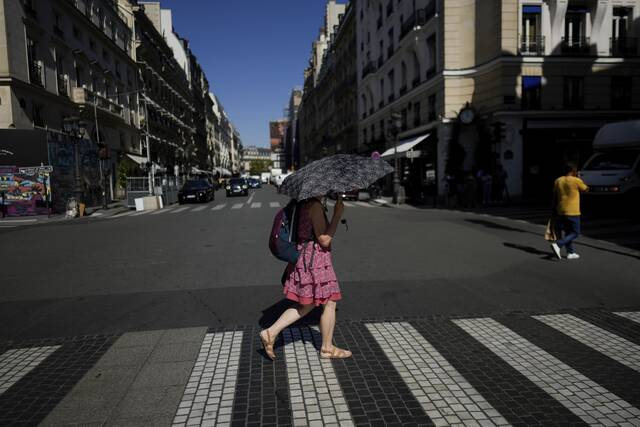After a summer of record-smashing heat, warming somehow got even worse in September as Earth set a new mark for how far above normal temperatures were, the European climate agency reported Thursday.
Last month’s average temperature was 0.93 degrees Celsius (1.7 degrees Fahrenheit) above the 1991-2020 average for September. That’s the warmest margin above average for a month in 83 years of records kept by the European Space Agency’s Copernicus Climate Change Service.
“It’s just mind-blowing really,” said Copernicus Director Carlo Buontempo. “Never seen anything like that in any month in our records.”
While July and August had hotter raw temperatures because they are warmer months on the calendar, September had what scientists call the biggest anomaly, or departure from normal. Temperature anomalies are crucial pieces of data in a warming world.
“This is not a fancy weather statistic,” Imperial College of London climate scientist Friederike Otto said in an email. “It’s a death sentence for people and ecosystems. It destroys assets, infrastructure, harvest.”
Copernicus calculated that the average temperature for September was 16.38 degrees Celsius (61.48 degrees Fahrenheit), which broke the old record set in September 2020 by a whopping half-degree Celsius (0.9 degrees Fahrenheit). That’s a huge margin in climate records.
The hot temperatures stretched across the globe but they were chiefly driven by persistent and unusual warmth in the world’s oceans, which didn’t cool off as much in September as normal and have been record hot since spring, said Buontempo.
Earth is on track for its hottest year on record, about 1.4 degrees Celsius (2.5 degrees Fahrenheit) warmer than pre-industrial times, according to Samantha Burgess, Copernicus’ deputy director.
This past September was 1.75 degrees Celsius (3.15 degrees Fahrenheit) warmer than the mid-1800s, Copernicus reported. The world agreed in 2015 to try to limit future warming to 1.5 degrees Celsius (2.7 degrees Fahrenheit) warming since pre-industrial times.
The global threshold goal of 1.5 degrees Celsius is for long-term temperature averages, not a single month or year. But scientists still expressed grave concern at the records being set.
“What we’re seeing right now is the backdrop of rapid global warming at a pace that the Earth has not seen in eons coupled with El Nino, natural climate cycle” that’s a temporary warming of parts of the Pacific Ocean that changes weather worldwide, said U.S. climate scientist Jessica Moerman, who is also president of the Evangelical Environmental Network. “This double whammy together is where things get dangerous.”
Though El Nino is playing a part, climate change has a bigger footprint in this warmth, Buontempo said.
“There really is no end in sight given new oil and gas reserves are still being opened for exploitation,” Otto said. “If you have more record hot events, there is no respite for humans and nature, no time to recover.”
Buontempo said El Nino is likely to get warmer and cause even higher temperatures next year.
“This month was, in my professional opinion as a climate scientist — absolutely gobsmackingly bananas,” climate scientist Zeke Hausfather said on X, formerly known as Twitter.



















